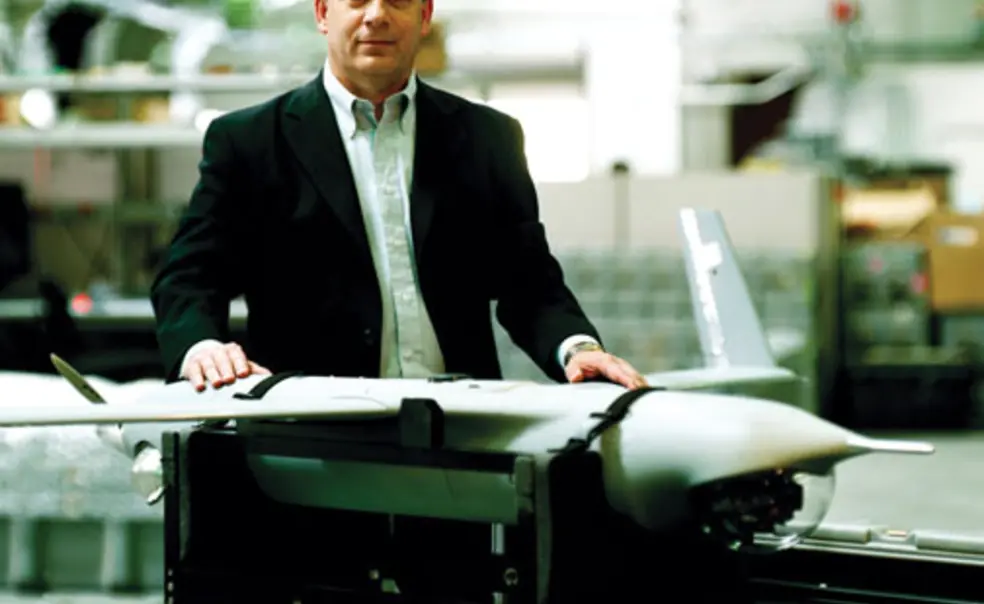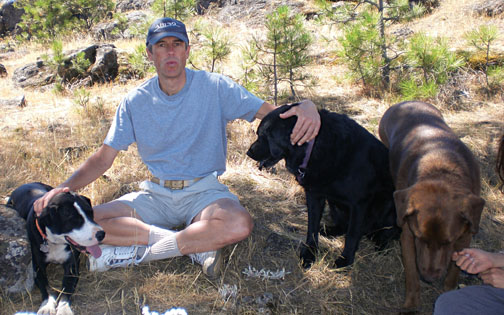Alumni Profile: Steve Sliwa '77 and Tad McGeer '79, protecting sailors and soldiers in hot spots
People across the nation were riveted when pirates took Capt. Richard Phillips of the shipMaersk Alabama hostage off the Somali coast last April. Steve Sliwa ’77 was no exception, but he was more optimistic than many people.
Sliwa is president and chief executive of Insitu, a Bingen, Wash.-based producer of unmanned aerial vehicles (UAVs). His company’s ScanEagle was key to the rescue attempt — it flew overhead, providing video surveillance of the lifeboat in which Phillips was held captive to the crew of the destroyer U.S.S. Bainbridgesent to save the captain.
“At the time, I was confident he would be protected,” said Sliwa, who was receiving updates every hour or two.
On April 12, Navy SEALs rescued Phillips, killing one pirate and capturing three others.
“When word was out that ... Capt. Phillips was rescued, there was a bunch of ‘high fives’ in our various buildings and conference rooms,” Sliwa said. While this incident had more visibility than many, Sliwa noted that UAVs are being used all over the world to protect soldiers and sailors, from saving troops from ambush in enemy territory to warning seamen preparing to board ships to inspect them that pirates lie in wait.
Developed in a partnership between Insitu and Boeing, the ScanEagle is deployed on some 25 naval ships around the world, and is used extensively in military operations in Iraq and Afghanistan, among other locations. Weighing 44 pounds when loaded with fuel and featuring a wingspan of 10 feet, the drone is equipped with a high-resolution camera and a quiet engine for increased stealth. The aircraft can fly for more than 24 hours continuously, and can be launched from land or a ship’s deck.
While Insitu’s UAVs now are used primarily for defense, this wasn’t always the case. When Tad McGeer ’79 started the company in 1991 (it was incorporated in 1994), he was focused on the use of unmanned aircraft for weather surveillance.
In 1998, Insitu made aviation history when one of its UAVs became the first to cross the Atlantic. This ultimately led to the partnership in 2001 with Boeing. The deal was in the works before the terrorist attacks of Sept. 11, 2001, which dramatically increased demand for the systems. That same year, McGeer brought Sliwa to Insitu — each had majored in mechanical and aerospace engineering and attended graduate school at Stanford. McGeer left the company in 2005 to start Aerovel, a miniature robotic-aircraft developer.
Shortly after taking the helm, Sliwa recruited his college roommate Steve Heppe ’77, who stayed until going into semi-retirement this year. About four years ago, Sliwa hired Brad Schrick ’78 to join Insitu’s marketing group.
“One thing that’s created a lot of pleasure for us, being engineers, are the kudos we get from the soldiers, Marines, and sailors who are the beneficiaries of ScanEagle,” Sliwa said.
Since Sliwa joined the company, it has grown from four to more than 700 employees and recently completed production of its 1,000th ScanEagle aircraft (Insitu also produces two other UAVs, Integrator and NightEagle). The robotic planes are the best-selling aircraft in Boeing’s fleet.
After years of partnership, Boeing acquired Insitu last year as an independent subsidiary, a status that has allowed Insitu to preserve its culture, Sliwa said, including the dog-friendly policy started by McGeer, who was accompanied to the Insitu offices by his dogs: Moesha, a Labrador retriever-chow mix; Axel, a Chesapeake Bay retriever mix; and Tamari, a German shepherd mix.
With the company’s rapid growth, however, they’ve had to amend this policy — employees are now permitted to bring their dogs in just one day a week, instead of every day.













No responses yet